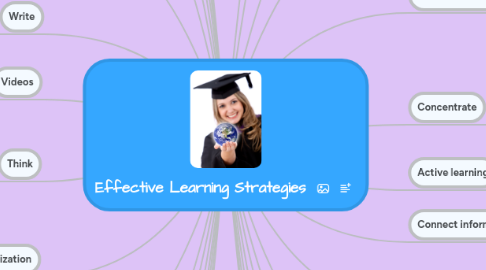Effective Learning Strategies
by Galib Ali


1. Restudying material after initial reading
2. Improve performance
3. Explaining how new information is related to known information
4. Feelings
5. Teach
5.1. You colleagues
5.2. Other students
6. Deliberate practice
6.1. Quality + Quantity
6.2. Highly structured
6.3. Requires
6.3.1. Focus
6.3.2. Effort
6.3.3. Time
6.4. Process
6.4.1. Immediate informative feedback on performance
6.4.2. Build on existing knowledge
6.4.3. Repeat until mastered
6.4.3.1. Not inherently enjoyable
6.4.4. Motivated to improve performance
7. Simulate
7.1. Procedural knowledge (process)
7.2. Practice with new problems
8. Logical
8.1. Sound reasoning
8.2. Part makes sense in the whole
9. Visualize
9.1. Pictures, colors, cartoons
9.2. Diagrams, charts, graphs
9.3. Bizzare visualizations/associations
10. Practice testing
10.1. Self-testing
10.2. Practice tests
10.3. Practice recall
10.4. Helps with future retrieval
11. Filter
11.1. Choose important concepts
11.2. Eliminate the fluff
12. Highlighting/ underlining
12.1. Mark important text
12.2. Difficult to make connections
13. Connect with others
13.1. Interact with others students
13.2. Group work
13.3. Teachers
13.4. Parents
14. Concentrate
14.1. Stay focused
14.2. Pay attention
15. Active learning
15.1. Interact with information
16. Connect information
16.1. Connect the dots
16.2. How does it all connect?
16.3. Build new knowledge on existing knowledge
17. Elaborate
17.1. Work with extended information
17.2. Beyond class materials
18. Elaborative interrogation
18.1. Generate explanations
18.2. Why is this true?
19. Emotions
19.1. Heart
20. Explain
20.1. Discuss with others
20.2. In your own words
21. Environment
21.1. Change study place
21.2. Slows down forgetting
22. Experience
22.1. Life is greatest teacher
22.2. Case studies
23. Feedback
23.1. See results of how you're learning
23.2. Adjust learning strategies based on feedback
24. Imagery for text
24.1. Form mental images of text
25. Interleaved practice
25.1. Different kinds of materials
26. Keyword mnemonic
26.1. Keywords
26.2. Mental imagery
27. Meaningful
27.1. Does it make sense to you?
27.2. Learn from general to specific
27.2.1. Start with outline
27.2.2. Add details
